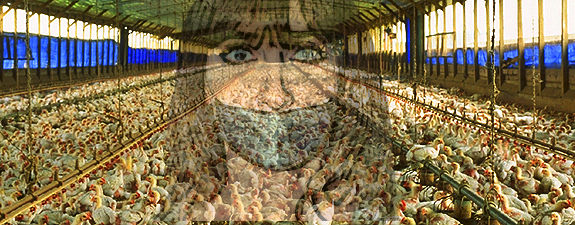
Mash-up by EarthDesk. Lorelei7 [GFDL or CC-BY-SA-3.0], from Wikimedia Commons. Chicken House By Larry Rana (USDA) [Public domain], via Wikimedia Commons.
Amy Myer is also one of the plaintiffs in the case against Utah. The venerable Jim Hightower tells her story on his blog:
A resident of Utah, which passed its gag law last year, Meyer heard about some ugly doings at the Smith & Sons Meat Packing outfit in the town of Draper City, so she decided to take a look. Even from the public roadway, where she stood, the horror was easy to see, and she dared to document it with her camera. The corporate manager scrambled out to declare that she was trespassing, later claiming she’d crossed a barbed-wire fence onto corporate property. Cops were called, no such trespass was found, and she was released. But the corporation, whose owner just happens to be mayor of Draper, got city prosecutors to charge her with – ready? – “agricultural operation interference,” punishable by a six-month jail term.
Today, the Animal Legal Defense Fund posted an update with details of the new case and some reactions:
SALT LAKE CITY — On Friday, the state of Utah filed a motion to dismiss the landmark “ag gag” lawsuit filed by national nonprofits Animal Legal Defense Fund (ALDF) and People for the Ethical Treatment of Animals (PETA). The first-of-its-kind lawsuit, filed in the U.S. District Court of Utah, challenges the state’s ag gag law for violating rights protected by the U.S. Constitution by criminalizing the collection of evidence of animal abuse at factory farms. The lawsuit was filed on behalf of ALDF, PETA, the political journal CounterPunch, journalists Will Potter and Jesse Fruhwirth, undercover investigator Daniel Hauff and professor James McWilliams, all of whom rely upon undercover investigations in their professional work to expose egregious animal cruelty and food safety violations. Amy Meyer, the first person in the nation prosecuted under an ag gag law, is also a plaintiff.
Since the August, 2013 filing of the lawsuit, ALDF’s petition to repeal Utah’s ag gag law has received more than 35,000 signatures on Causes.com. Although Utah claims the law is constitutional, the lawsuit has received widespread support from constitutional law experts.
- The Association of American Prosecuting Attorneys has said, “any prosecution under Utah’s agricultural operation interference law [will] be vulnerable to successful defense challenges under the First Amendment.”
- “Ag gag bills like Utah’s are completely antithetical to the First Amendment,” said Timothy Zick, Professor of Law at the College of William and Mary and a nationally recognized constitutional law expert.
- “Utah’s ag-gag law is unconstitutional. It limits free speech by criminalizing undercover reporting on factory farms–targeting and chilling political speech about animal well-being and food safety,” says Ani Satz, Professor of Law at Emory University.
“This is nothing but an attempt to silence citizens who expose animal cruelty,” said Stephen Wells, executive director of the Animal Legal Defense Fund. “Rather than trampling upon our rights, our lawmakers should be helping us enforce the law against the chronic abuse of animals on factory farms.”
“PETA’s investigations have documented farm workers kicking pigs in the head, spray painting them in the eyes, stomping and throwing chickens and turkeys like footballs, and smashing piglets’ heads against concrete floors,” said Jeffrey S. Kerr, General Counsel to PETA. “Utah should pass a law requiring publicly accessible webcams in slaughterhouses and on farms to catch the abusers, not protect them. The state’s motion, like the ag gag law itself, is designed to shield this industry from scrutiny.”
Attorneys from the University of Denver’s Sturm College of Law and the Utah Legal Clinic and other First Amendment experts, including Colorado attorney Ed Ramey, are providing pro bono legal assistance on the case. The plaintiffs will respond to the State’s motion in December at which time the federal court will likely schedule a hearing.
Copies of the complaint are available by request.
ALDF was founded in 1979 with the unique mission of protecting the lives and advancing the interests of animals through the legal system. For more information, please visit aldf.org.
PETA was founded in 1980 and focuses its attention on the four areas in which the largest numbers of animals suffer the most intensely for the longest periods of time: on factory farms, in the clothing trade, in laboratories, and in the entertainment industry. For more information, please visit PETA.org.









